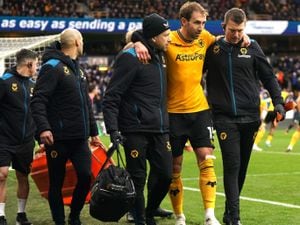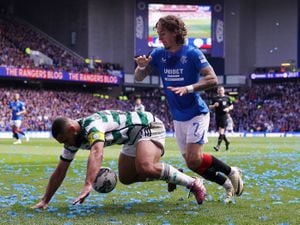Sky Sports' Johnny Phillips: Backing for Nuno is light years from Dave and Mick
Former Wolves captain Karl Henry, reflecting on the 2008/09 Championship title-winning squad’s achievement, lamented: “We never quite got the credit we deserved.”
He made the comments this week during a guest appearance on the club’s podcast. It was a thought-provoking and erudite defence of Mick McCarthy’s team from a man who played a huge part in the club’s success.
“What Mick did at that time, and what we did as a squad, was phenomenal. And he did it on a shoestring budget. It felt at the time that the 2003 team was more revered than we were,” he explained.
Henry is not alone in thinking this way, admitting that others in the 2008/09 squad also got a bit fed up of hearing how good the 2002/03 First Division play-off winners were.
And now, as Wolves are prospering under Nuno Espirito Santo, there seems to be little harking back to the last team to win The Championship title before the success of the 2017/18 squad.
“During our era, they [the fans] were talking about the previous era. During the current era they are not talking about our era at all,” he added.
Context is crucial here. There is an obvious reason why the 2002/03 team may be more fondly remembered amongst a certain generation, and that is because of what went on before.
As the famous Toaster banner on that glorious May afternoon in Cardiff proclaimed, it had been 19 years since Wolves had last graced the top flight. Dave Jones’s team broke through a ceiling and put to bed two decades of disillusionment and disappointment.
Which Ashes winners are revered more? Michael Vaughan’s 2005 team who scraped home with a 2-1 victory on English soil, or Andrew Strauss’s team who achieved the arguably greater feat of winning convincingly in Australia in 2010/11, or Alastair Cook’s 2013 vintage who battered Australia 3-0?
It will always be Vaughan’s side. They were the ones who put an end to the harrowing run of defeats and reclaimed the urn in such dramatic fashion.
That 2005 victory was a tense and nail-biting affair, just as Wolves’ promotion in 2002/03 was always in the balance until the very last game of the season.
Victory through the play-offs is more dramatic and provides a spectacular backdrop to promotion. McCarthy’s side were so good that, when they hit the front early in the season, they never relinquished top spot.
What about the opposition around them? McCarthy’s side romped to the title with 90 points. But the same points haul would only have been good enough for a play-off place back in 2002/03. Some might argue, similar to Vaughan’s Ashes team, that Jones’ success was achieved in more competitive circumstances.
Henry’s comments should not be interpreted as sour grapes but, in saying this, he has conceded there may be a little chip on the shoulder. That is only natural. Henry was one of the best captains the club has ever had, at a time when they were crying out for someone to lead on the pitch. He wore his heart on his sleeve and gave everything for the cause. He is right to describe McCarthy’s promotion as phenomenal.
When Glenn Hoddle left Wolves in the lurch a month before the start of the 2006/07 season, McCarthy came in to a situation that appeared hopeless.
Instead, he led an unfancied side into the play-offs. Then followed that up with a near miss seventh place finish the following campaign before going on to achieve that famous title win the year after.
His side was famously built on a strong work ethic, with young and hungry players eager to prove their worth. McCarthy unearthed gems like Stephen Ward, Michael Kightly and Matt Jarvis for relative pennies.
They were great times and those supporters who witnessed that season are thankful for it. They also achieved something the 02/03 crop could not manage: survival in the Premier League. Jones’s side came straight back down, whereas McCarthy’s side lasted three seasons at the top.
The blend of Jones’s side was more colourful than McCarthy’s, which may also go some way to explaining why they are remembered so fondly.
The up-and-coming talents of Matt Murray, Lee Naylor and Joleon Lescott mixed with the big names of British football such as Paul Ince and Denis Irwin. There were a few hotheads in there too; from captain and centre-back Paul Butler, midfield enforcer Alex Rae and fiery frontman Kenny Miller.
There were no shortage of on-field voices. They were not afraid to fall out with each other, with many of them admitting they did not particularly get on well off the pitch, but they kept the common goal in sight. These larger than life characters left their mark on spectators.
McCarthy’s players were different. The team grew together more cohesively. Perhaps they were a more humble bunch who kept a lower profile.
Times have changed again, with the club’s third promotion to the Premier League. Nuno’s promotion bears no resemblance to either of the previous achievements. Backed by Fosun’s millions, this management revolutionised the playing style.
There has been such a cultural shift in the way the club operated, from the moment the players walked into training on a Monday morning to the time they left The Championship pitches on a Saturday afternoon.
What the whole debate also flags up, regardless of which side is recognised more, is the futility of such comparisons. All three promotions have great merit in their own right.
They were enjoyable for so many different reasons.
Perhaps, at last, the club has got it right at the third time of asking. What cannot be disputed is that Nuno has been given the backing neither Jones nor McCarthy was given when it came to establishing the club in the Premier League.





